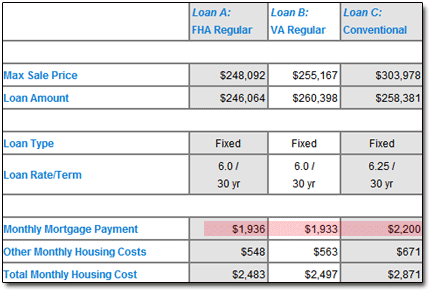 It's been years since I dug out my copy of Jonathan Pond's Your Money Matters: 21 Tips for Achieving Financial Security in the 21st Century. But in flipping through it recently, I stumbled across the following chunk of wisdom:
It's been years since I dug out my copy of Jonathan Pond's Your Money Matters: 21 Tips for Achieving Financial Security in the 21st Century. But in flipping through it recently, I stumbled across the following chunk of wisdom:Keep in mind that Pond published Your Money Matters in 1999. The above section struck me as a wee bit prescient — and if not "prescient," per se, it was at the very least good advice that way too few folks heeded in the first six or seven years of the 2000s.
Ours is a world where banks, mortgage brokers, realtors and FHA payment calculators historically have told potential homebuyers, "Don't worry — you'll grow into the payment!" My wife and I heard this mantra when we bought our first (and so far, only) home back in 1996. Yet even then, with incomes in the mid-$20ks, we bought less house than the bank said we could afford ... and less house than our realtor suggested. Why?
Because (1) we could do the math of income-versus-expenses, and (2) we knew Poop Happens.
Stretching to make a house payment — even with income increases ("They're a given!") in the following years — seemed a really, really dumb thing to do.
So we didn't.
Today, our house payment is less than $700/month. That's on a 5.5 percent, 15-year note. And half of the interest we pay the bank, we get back in the form of a federal MCC tax credit each year. When we refi'd back in 2003, we took NO cash out ("You did WHAT?!") and replaced our previous 30-year-fixed note with the 15-year-fixed variety.
Clearly, given the world's ongoing housing-centric difficulties, Lisa and I did it all wrong. Or, at least, we took a distinctly un-American path.
Go ahead: Tell me I'm an idiot for not Shop-Vac'ing out our home's equity and pouring it into, say, a basket of mutual funds. I'll counter that (1) folks who are banking on the stock market to hit double-digit investment growth goals are in for a world o' hurt going forward, and (2) oddly enough, a complete lack of "house payment stress" has tremendous personal value to me.
I mean, heck, I can sleep at night, and quite well, too. And I didn't need legislative idiocy from Barney Frank or any other policy-crafting messiah to do it.
I have no idea what the future holds. What I do know is that right now, making our house payment is a monthly non-issue. It happens automatically. That $700, when it leaves my ING Electric Orange account, is well less than 25 percent of our take-home income these days.
Do I notice the money leaving our account? Sure.
Do I worry about it? Not even a little.
It's crazy, I know. According to what I see on TV and read in the papers, we're all supposed to be worried about our homes' values. We're all supposed to be worried about how we can possibly be expected to keep up with ... well, with keeping up.
I understand all the societal consternation. While my hope is that some of the mortgage- and banking malfeasances are being wrung from the system, my head tells me that wildly regrettable decisions are still being made. These, in the name of "full access to credit" and "expanding home affordability."
For instance, look at what FHA's house-payment affordability calculator says Lisa and I can afford these days:

Nineteen hundred bucks a month? Are they eff'n serious?
What if one of our cars died?
What if our medical expenses rose?
What if we needed a new roof?
What if we decided to eat? Or, perish the thought, buy name-brand toothpaste?
Holy cow. We couldn't afford an extra $1,200/month in house payments if we wanted to do so. Good thing I know my finances (and life's sharper realities) way better than the FHA does.
(Though when you're a bank, and the taxpayer's got your back, I guess it doesn't much matter.)
But I fear that I, my realism, and my ability to appreciate cold hard numbers are in the minority. Were Joe and Jane Sixpack, whose theoretical finances are similar to ours, to see that same calculator, what would they think? Would they balk?
Or would they take "You'll grow into the payment!" as the Gospel According to the NAR, and head for the nearest subdivision of McMansions?
Looking forward, Lisa and I have no delusions: This home, and its worry-free payment, is not our "forever" home.
What it is, though, is our "just fine for now" home.
I've made some dumb money decisions in my life, to be sure. But the more I live through the current economic crappiness, the more I appreciate our decision to play the American Dream of Homeownership game oh-so-conservatively.
We can sleep at night.
We can save money.
Mr. Pond, if you ever read this, here's hoping you'd be at least a little proud.
Labels: Homeownership


